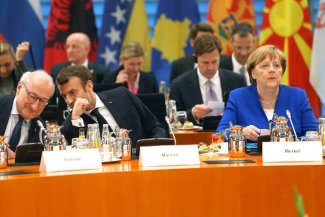EU split over enlargement policy

On 18th June the Council of the European Union again postponed the decision to open accession negotiations with Albania and North Macedonia. Procedural questions linked with Germany’s failure to take a position were the official reason for the delay. Last year, the Council of the EU announced it would settle this issue in June 2019. The European Commission positively assessed reforms carried out in both countries and recommended opening accession negotiations. Albania has met the conditions set by the EU in order to commence the negotiations; this includes carrying out a challenging reform of the judicial system. North Macedonia has also fulfilled all its EU commitments. It has also signed and implemented an agreement with Greece regarding the change of the country’s name and it has extended the rights of its Albanian minority.
Commentary
- Above all, it is France that is opposed to launching the accession negotiations, alongside the Netherlands and Denmark. The French government is reluctant to accept any new member states before a reform of the entire EU is made. Furthermore, France does not regard the Western Balkans as a priority area of EU policy and sees concessions in this matter as a bargaining chip in negotiations with other EU member states. Denmark and the Netherlands have objections regarding the state of the rule of law in the Balkan states, whereas the countries from Central and Eastern Europe as well as Austria and Italy are proponents of enlargement policy. On the initiative of Poland, on 11th June they presented a joint statement calling for negotiations with Albania and North Macedonia to be opened in June 2019. They also emphasised that if the decision on this matter was not made, it would have negative implications for the effectiveness of EU policy towards the Western Balkans and the situation in the region. The debate within the EU has indicated that a compromise in this area will also be very difficult to reach in autumn.
- Officially, the German government remains in favour of bringing the Western Balkan states closer to the EU. However, the waning support for the ruling parties in Germany and internal disputes in the coalition make it more difficult to sustain a consistent policy. Formally, Germany’s support for the accession negotiations within the EU is contingent on the agreement of the Bundestag and the debate on this issue has been postponed until autumn. In the CDU and CSU there is growing scepticism over the prospect of admitting new member states to the EU. In the area of the enlargement policy, the Christian Democrats are under pressure from the AfD which challenges both the capacity of the states from the region to meet EU standards and the potential benefits their membership would have for the EU. Most likely, Berlin was also keen to avoid stoking the dispute with France in this area at a moment when crucial decisions about the shape of the future European Commission and the appointments for the leadership posts in the EU institutions are being made.
- The political contention over the opening of the accession negotiations is technical in nature, but does not determine the decision about accession. It does, though, point to the lack of consensus within the EU regarding the priorities of the policy towards the Western Balkan states. The EU policy towards the Balkans was meant to be merit-based and the deepening of integration once the conditions set by the EU have been met. According to the reports from the European Commission, neither North Macedonia nor Albania differ in the extent of their preparedness from Montenegro and Serbia, with whom negotiations were launched in 2012 and 2013 respectively. The government in Skopje is in a particularly difficult situation since it has agreed to change the name of the country for the sake of the accession negotiations with the EU. The lack of a decision on the opening of the negotiations will weaken the EU’s ascendancy over the governments of the states in the region in the area of implementing reforms or settling bilateral disputes. Above all, this concerns the Serbian-Kosovar conflict. which has a key impact on the region’s stability. The lack of consistency in EU policy has also been used by anti-Western circles and countries such as Russia in order to weaken Euro-Atlantic aspirations of the countries in the region.

